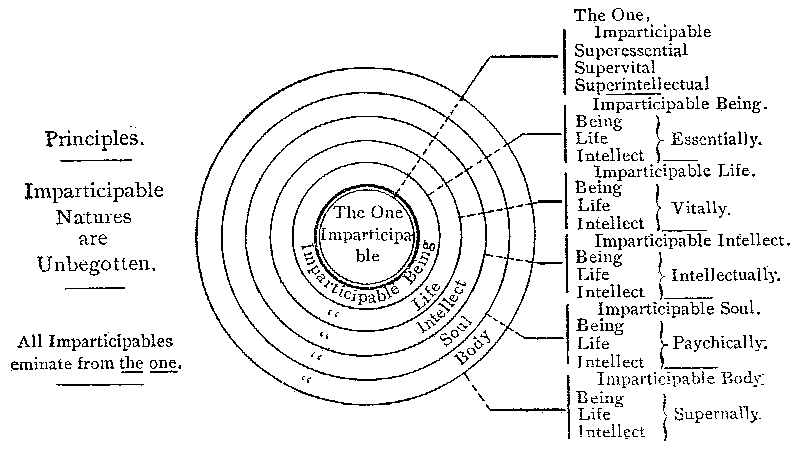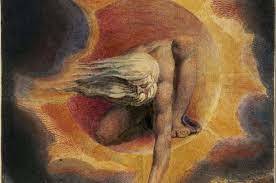 Proclus's Elements of Theology, Proposition 1
Proclus's Elements of Theology, Proposition 1Every multitude partakes in some respect of The One.
For if it in no way or degree participates of The One, neither will the whole be one, nor each of the many things from which multitude arises, but each multitude will originate from certain or particular things, and this will continue ad infinitum. And of these infinites each will be again infinite multitude. For, if multitude partakes in no respect of any one, neither as a whole nor through any of its parts, it will be in every respect indeterminate. Each of the many, whichever you may assume, will be one or not one; and if not one will be either many or nothing. But if each of the many is nothing, that likewise which arises from these will be nothing. If each is many, each will consist of infinites without limit. But this is impossible. For there is no being constituted of infinites without limit, since there is nothing greater than the infinite itself; and that which consists of all is greater than each particular thing. Neither is any thing composed of nothing. Every multitude therefore partakes in some respect of The One.
The One is the First Principle, and that by virtue of which all other things have their existence. What Proclus is telling us here-- or reminding us-- is that unless anything has unity of some kind, it cannot exist at all. The alternatives are unity, multiplicity, or non-existence. Obviously the non-existent does not exist. But anything which has multiplicity but no unity will also not exist-- it will consist of fragments, and then fragments of fragments, endlessly divisible, with no part ever able to come together as a whole. No two parts will ever be able to interact with each other, because to do so, they would need to share some common property. But if they shared a property in common, that would be a form of unity, and, lacking one, there is no unity. No part will even be able to be "one part," because to be "one part" is to be one particular thing. Instead there willl only be parts of parts of parts of parts of parts of parts of parts, extending endlessly forever.
One easy way to understand this-- and a way that Plato himself would have approved-- is to consider mathematics. Every number, multiplied by 1, remains itself. What this means is that there is always a certain hidden 1 for every number. 2 x 1 = 2, 400 x 1 = 400, π x 1 = π.
The Identity of the Good and the OnePlato taught that the One is identical with the Good. In the
Republic, discussing the establishment Justice in the Soul, he tells us that the just man is one who has become one out of many:
In reality Justice was such as we were describing, being concerned however, not with the outward man, but with the inward, which is the true self and concernment of man: for the just man does not permit the several elements within him to interfere with one another, or any of them to do the work of others,—he sets in order his own inner life, and is his own master and his own law, and at peace with himself; and when he has bound together the three principles within him, which may be compared to the higher, lower, and middle notes of the scale, and the intermediate intervals—when he has bound all these together, and is no longer many, but has become one entirely temperate and perfectly adjusted nature, then he proceeds to act, if he has to act, whether in a matter of property, or in the treatment of the body, or in some affair of politics or private business; always thinking and calling that which preserves and co-operates with this harmonious condition, just and good action, and the knowledge which presides over it, wisdom, and that which at any time impairs this condition, he will call unjust action, and the opinion which presides over it ignorance.
The identity of the Good and the One was the theme of Plato's only public lecture, the text of which is lost to us, but which was described by some of his contemporaries-- including Aristotle, who claimed not to understand it. (The failure to privilege Plato over Aristotle is the great mistake of Western civilization-- but that's a story for another time.)
The One is SuperessentialFollowing Plato, Proclus will also tell us that the One is "Superessential." This is a word which has no English meaning, and the eye trained in American English tends to pass over it. In every day use, "essential" means "really important" and "super" means "really really," so at best, we get the idea that "The One is superessential" means "The One is a very big deal."
Now the word "essential" is rooted in "essence," and thus shares the same root as the Latin word "esse," which means "to be." Knowing this, we can take a step further, and say that "The One is superessential" means "The One is beyond being." This is closer to the point, but we're still missing the target. The trouble is that this gives us the impression that the One does not exist, or that the entire thing is a sort of paradox.
The Greek word which is translated as essentia in Latin or essence in English is
ousia, and "superessential" is
hyperousia. Ousia does not mean "being," or at least, not in the same way that we mean it in English. Originally it actually refers to the boundaries which mark a property line-- and, as an aside, it's worth remembering that "property" was not a secular concepts with the ancients as it is with us; rather, the boundary line between properties was a sacred thing, presided over by a God. That said, knowing this will help us get to the real meaning of the term. Ousia denotes a kind of particularity-- to be ousia is to be one thing above many. But the One cannot be one thing out of many, because then there will be things which do not participate in the One-- and here we're back to the problem of the parts of parts of parts of parts described above. Rather the One, the Good, is above particularity, not one thing in a set of things, but simultaneously present to but beyond all particular things.
NeoplatonismsProclus was a pagan, and, indeed, one of the last great philosophers of the Pagan world. His six-volume Theology of plato is deeply concerned with applying the dieas that he learned in the work of Plato to the particular gods of the ancient Greek world. And so the Demiurge or Creator-God of the Timaeus, left unnamed by Plato, is identified with Zeus, the paradigm, or model on which he creates the world, with Ouranos, and so on through a cascading series of triads. The One, for Proclus, is called God or the First God, but is otherwise left unnamed. The One is without qualities, and so cannot be part of a triad, as are the gods that follow from him. But also for Proclus, all of the Gods are super-essential-- above particularity-- not just the One.
Before Proclus, Plotinus's system was much simpler. For Plotinus there are three primary hypostases-- the One, Divine Intellect, and the Universal Soul. These can be identified with Ouranos, Cronos, and Zeus, with Zeus again as Creator, looking to Cronos as his paradigm. Myth plays a minimal part in Plotinus's system, and ritual no part at all; Plotinus famously refused to attend sacrifices, stating "It is for the Gods to come to me, not me to go to them."
Sometime after Proclus, a writer who went by the pen-name of Dionysius the Areopagite assigned the entire Christian Holy Trinity to the place of the One. For Dionysius, the One is triadic, or, rather trinitarian. In place of the layered triads of Gods in Proclus's work, Dionysius has choirs of angels-- 9 in all, 3 groups of 3. But For Dionysius, only the Holy Trinity is superessential. The angels are not.
After Dionysius, the Ismaili tradition within Islam preserves the One as completely unitary, with no triads or trinities, as in Proclus. But here the One is God, or Allah. Intellect and Soul are secondary entities, exalted indeed, but not the First. In this tradition, Mohammed is sometimes said to shine with "the Light of Intellect," and Ali with "the Light of Soul." Allah remains forever beyond knowing.
Of course, many years even before Plotinus, Philo of Alexandria had applied Platonic principles to his native Jewish religion, reasoning that Plato must have studied the books of Moses.
The Names of GodIn the Barddas of Iolo Morganwg, we read the following:
Einigan the Giant beheld three pillars of light, having in them all demonstrable sciences that ever were, or ever will be. And he took three rods of the quicken tree, and placed on them the forms and signs of all sciences, so as to be remembered; and exhibited them. But those who saw them misunderstood, and falsely apprehended them, and taught illusive sciences, regarding the rods as a God, whereas they only bore His Name. When Einigan saw this, he was greatly annoyed, and in the intensity of his grief he broke the three rods, nor were others found that contained accurate sciences. He was so distressed on that account that from the intensity he burst asunder
And elsewhere:
Why is it not right that a man should commit the Name of God to vocalization, and the sound of language and tongue?
Because it cannot be done without misnaming God, for no man ever heard the vocalization of His Name, and no one knows how to pronounce it; but it is represented by letters, that it may be known what is meant, and for Whom it stands.
But what does it mean that men worshipped the name of God, and not God himself? Why is it that the name of God cannot be pronounced?
Imagine a name. Don't pick a personal name-- just pick a noun, the first thing in your field of vision. Around me I see "computer," "coffee cup," "keyboard," and "cat." (Notice the hard-c sounds.) Each one of these words contains information. I hear the word "cat." Immediately, I am given access to certain information: Cats are four-footed predatory animals, companions of humans, smaller than dogs but larger than mice, given to sleeping, sulking and skulking. All this emerges from the word "Cat." On its own, however, "cat," k-a-t, is a mere syllable. To a Spaniard or a Chinaman, ignorant of English, it means nothing at all. On the other hand, let either hear the word "gato" or "mao," and they will gain access to the same information that I do when I hear "kat."
The particular cat sitting next to me right now is named Hopper. When I hear that name, "Hopper," and associate it with a cat, I gain a great deal more information. Hopper is orange in color, nervous around unfamiliar humans, frightened of dogs, affectionate with familiar humans and with other cats; he was found in a box and brought to a cat shelter in Santa Barbara, where he was adopted by a family for their son's 8th birthday. He is four years old, and I could go into detail about his biography, but I won't.
Notice, though, that the name suggests a story. The name is not the cat. The story is also not the cat. A neighbor might have a different name for Hoppper, referring to him as "that orange cat," and might have a different story, like, "We see him skulking around here sometimes."
Now a cat is relatively simple being-- though I suppose you shouldn't tell the cats I said that. But it's not just that "cat," "gato," "mao," "felis," and so on all point to the same thing. Imagine something greater than a cat, like the Earth. Imagine our American, our Chinaman, and our Spaniard-- and set the clock back far enough in history that they are ignorant of one another and unable to share information via the internet. One calls the planet we live on Earth, the other calls it Tierra, the third calls it Tiqiu. They mean the same, but both their name and the story which accompaines the name will be radically different. Moreover, and critically, it is impossible to really have the same experience of Earth and Tiqiu and Tierra.
Now, cats, Hopper the Cat, and the planet Earth are all examples of particular
ousias, as we used that term earlier. For
Aristotle, both Hopper the Cat and the planet Earth are truly
ousia, while a category like "cat" or "planet" is
ousia secondarily. But all are
ousia-- named, particular substances, things which are "this" but not "that." This is a useful way of thinking about things, which is why Aristotle's works were picked up and re-purposed by the later Platonic commentators, starting with
Porphyry.
But God, as we have seen, is
beyond ousia-- or, in English, superessential.
And please note well: While debates exist about the role of Platonic philosophy within the Christian churches, the superessential nature of God is accepted by anyone. God as superessential and radically simple is Catholic doctrine. Dionysius the Areopagite is still venerated as a saint by the Orthodox, who are smart enough to not let historians dictate their religion to them.
Names are assigned to
ousias, and stories follow from names. Names and stories are not meaningless. They have immediate power. Hopper is a very entertaining cat, I hear his name and I smile and feel like laughing. Other names provoke me to wrath, or sorrow, or delight, or wonder. Many of these names will be meaningless to you, because you haven't learned the stories. The name is the title, the story is the book.
God; The One, the Good; Ouranous; Allah; God the Father; Holy Trinity; YHVH; IAO; OIW. These are Names of God. Appended to each name is a story. God is bigger than a cat, and God is bigger than the Earth. A story about Hopper can be learned, in its basics, in an hour. That story will be limited, though, because he's a four year old cat; I can tell you all about him, but if you haven't lived all four years of his life with him, you won't know the details of the story as I do. But I also don't know the story the same way as the other members of my household, or the other cats, or the neighbors, or the birds that he likes to argue with. If a story about a cat can take four years to learn and still not be complete, what can we say about a story about God? Surely it takes a lifetime to learn. And even then it still falls short. And not partially short, as in the case of the cat.
Infinitely short. What this means is that an infinite number of names, and an infinite number of stories, would never be enough to describe or contain God. And that, furthermore, means that we must allow many names, and many stories, if we want to know God at all.







